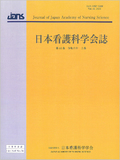Japanese
English
- 販売していません
- Abstract 文献概要
- 参考文献 Reference
要旨
目的:秘匿感情をもつ若年性認知症家族介護者が,認知症の進行と共にどのような経験をして開示していったのかを記述し理解することであった.
方法:質的記述的研究デザインを用い,若年性認知症家族介護者8名に対し,半構造化面接によりデータを収集した.
結果・考察:秘匿感情とその生じる背景として,【保持したいプライバシー】【偏見の存在】【守りたい自身の自己像】が抽出された.時間の経過とともに開示していく中で【相手との関係性に左右される開示抵抗感】【開示により生じる支障の見積もり】【開示により目指す当事者の希望の実現】【認知症の進行とともに変動する開示して得る支援ネットワークの必要性】【疾病受容に伴うセルフスティグマの変化】【開示の扉を開く外力】等を経験していた.介護生活の見通しを立てる支援,家族介護者の秘匿あるいは開示に対する認識や価値づけをアセスメントし心に寄り添う支援を行う必要性が示唆された.
Objective: To describe and understand how the concealment feelings and behaviors of family caregivers of persons with early-onset dementia changed and were eventually disclosed as dementia progressed.
Method: Using a qualitative descriptive research design, data were collected through semistructured interviews with eight family caregivers of persons with early-onset dementia.
Results & Discussion: "Wanting to maintain privacy," "stigma," and "wanting to protect selfimage" were extracted as reasons for concealment and their background. In the process of disclosing feelings over time, family caregivers experienced "resistance to disclosure determined by the relationship with the other parson," "evaluation of the effects after disclosure," "a desire to fulfill their loved one's wishes through disclosure," "need for the support network that can be gained through disclosure which changes as dementia progresses, " "changes in self-stigma associated with disease acceptance," and "external forces opening the door of disclosure." These results suggest the need for support that makes a forecast for long-term care life, and that also assesses the family caregiver's perceptions and values toward hiding or disclosing and understands their feelings.
Copyright © 2024, Japan Academy of Nursing Science. All rights reserved.


